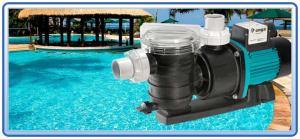A lot of people seem to be puzzled about which filter will perform best for their swimming pool. There is no single answer for that question, but the more you understand about swimming pool filtration the better decision you can make.
 There are three main types of swimming pool area filtration. They are fine sand, cartridge, or diatomaceous earth. Any of the three will do a good job at filtering your pool, but there are pros and cons for each of them. Let's see what they are.
There are three main types of swimming pool area filtration. They are fine sand, cartridge, or diatomaceous earth. Any of the three will do a good job at filtering your pool, but there are pros and cons for each of them. Let's see what they are.
Sand filtration – Sand filters use a special grade of silica sand to filter the pool water. The larger surface area of a filter equates to more gallons per minute that the filter can handle. As the water is passes from the top of the filter to the bottom, the sand captures the dirt and sends filtered water back to the pool. When the filter requires cleaning the water is reversed in the filter and the dirt is flushed out to waster. The sand filter is mid-range in cost of the filters and is the least expensive to operate.
Cartridge filtration -- These are perhaps the most convenient to understand and use. They perform similarly to the way an oil filter works in a car. A filter cartridge consists of a paper like material; the water from the pool passes through the filter and is returned to the pool cleaned. To clean a swimming pool filter cartridge, the filter is removed from the housing containing the filter and is hosed down to remove dirt and debris. Periodically the cartridge will require replacing. The Cartridge filter is the least expensive to buy and the most expensive to maintain.
Diatomaceous Earth (DE) – Diatomaceous earth filters in most cases use grids. Grids have a nylon fabric stretched over a substrate to hold the fabric; the grids are coated with DE by adding DE Powder to the skimmer.
Diatomaceous earth filters are perhaps the best water polisher of all the three filtration methods. The tiny diatoms can narrow out waste as small as 5 microns from your water, making it an excellent filtration media. Similar to the fine sand diatomaceous earth filters must be backwashed every so often when the pressure increases, typically when the pressure increases by 5 pounds. The used diatomaceous earth is washed away, and the filter is re-coated with fresh DE. DE filters are generally the most expensive to buy and intermediate in cost to maintain.
So what is the best swimming pool filtration system? That relies on several factors. What is most important to you? Cost, best water quality, ease of cleaning, long term cost. If your choice is lower initial cost, then cartridge filters is your best choice. If you want ease of maintenance, then sand is perhaps the better choice. If you want the best water quality, the DE filters are the best choice. Finally the lowest long term cost is sand, not requiring replacing cartridges or replacing DE.
What is popular in a particular area varies by geographic location in the country. Please remember water quality starts with water chemistry and in properly balanced water.
Hopefully, this article has assisted you understand a little bit more about the different kinds of swimming pool filtration systems that are available, how they perform, and what you can expect from each one. By analyzing the features listed above you should be able to decide which swimming pool filter will perform best for you. Please visit MyPool.com for your pool and patio needs.
Installing a quality pool filter is an important task that need to be performed by a pool owner. There is a wide range of product available in the market, so choosing a particular product becomes quite difficult. Out of all the filters available, Cartridge pool filters are the far better than others and the first choice of every pool owner. Thank you for sharing a nice information with us.
ReplyDeletePoolFilters.Biz